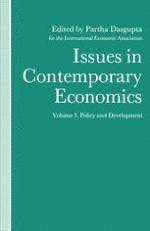
1991 | OriginalPaper | Chapter
Public Choice, Markets and the Problem of Ensuring an Adequate Minimum Level of Welfare
Author : Professor Edward F. McClennen
Published in: Issues in Contemporary Economics
Publisher: Palgrave Macmillan UK
Included in: Professional Book Archive
Activate our intelligent search to find suitable subject content or patents.
Select sections of text to find matching patents with Artificial Intelligence. powered by
Select sections of text to find additional relevant content using AI-assisted search. powered by
The topic of this symposium is public choice and agricultural economics. Since I am trained as a philosopher, I might be expected to address some philosophical problem that arises in the application of this paradigm to the economic aspects of agricultural production and distribution. A striking feature of the literature within agricultural economics, however, is that both those who defend, and those who object to, the application of the public choice paradigm focus on the strengths and weaknesses of the paradigm itself and have little to say about problems regarding its application to the particular subject matter of agricultural economics.1 I shall follow their lead. I want to explore an argument that, if successful, calls into question one presupposition of much public choice theory. This is that policy conclusions based on an appeal to some standard other than that of Pareto-efficiency (in particular, distributive concerns) requires specification of a social welfare function, something that lies beyond the competence of the economist as (social) scientist. Moreover, the argument I want to explore turns on considerations that are clearly within the public choice tradition itself, when it is more broadly conceived. Finally, if the argument succeeds, it also challenges another central presupposition of most public choice literature, that is, the standard model of homo economicus.